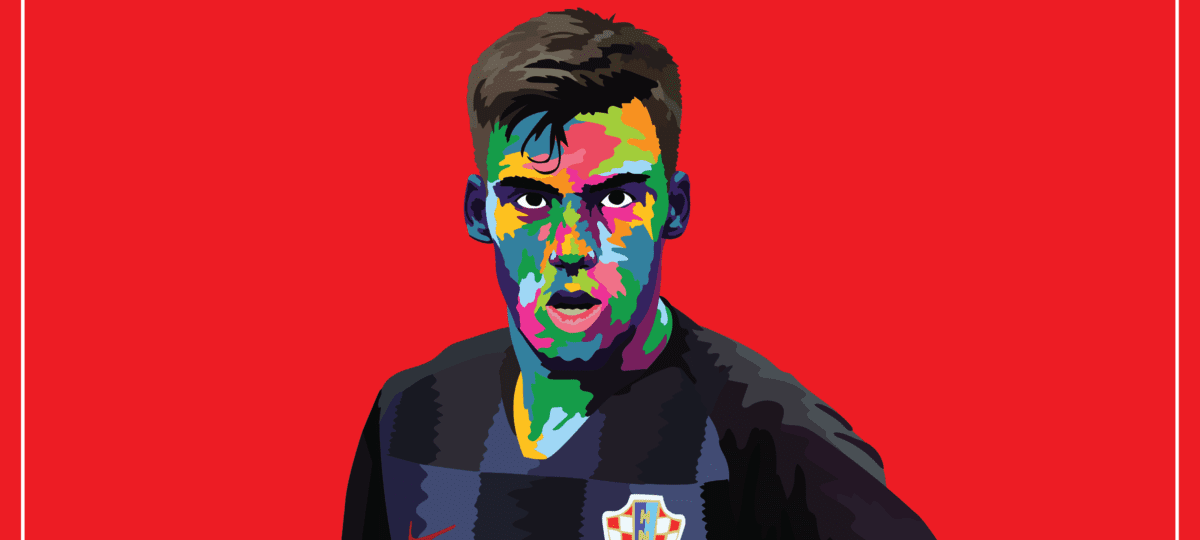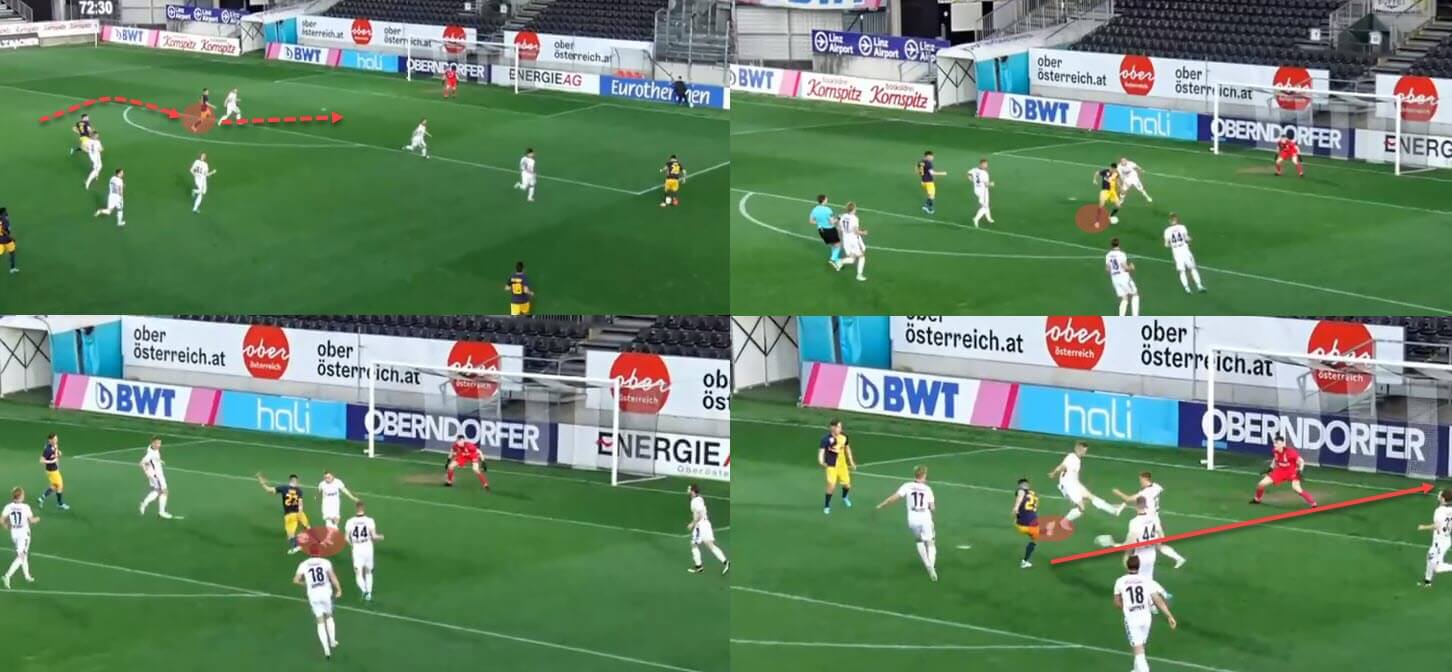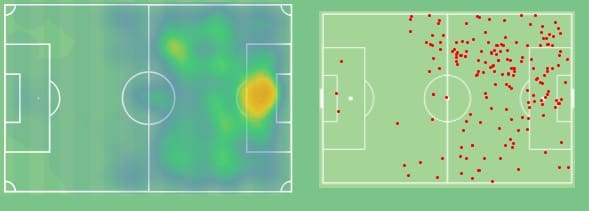The talent ID at Red Bull has always been top-notch.
Young players are quickly identified, scouted and secured before the competitors can even react.
Of course, often, the franchise is a stepping stone; the means to achieve the goal rather than the goal itself.
However, at the same time, it’s a necessary and a crucial step that not only boosts their development but also puts them under a spotlight for the world to see.
Roko Šimić, the 18-year-old striker currently on loan at FC Liefering from Red Bull Salzburg, could be the next young prodigy in line for a prosperous future.
Snatched away from Lokomotiva Zagreb, a team playing in 1. HNL, the Croatian first division, Šimić has already been likened to former Borussia Dortmund and future Manchester City superstar Erling Haaland and Juventus’ Dušan Vlahović.
This, inevitably, has also sprouted rumours linking him to the likes of Barcelona and Real Madrid.
So this tactical analysis will give you a full Roko Šimić scout report, showcasing his player profile within his team’s tactics and why it’s so appealing to the giants of the modern game.
Roko Šimić Style Of Play
We’ll start the analysis by identifying the most important aspects of Šimić’s profile through data.
Our first graph shows us how the young Croat has performed across three main categories in 2021/22, depicting figures and percentile rankings for attacking, passing and defensive metrics.
It’s here already that we can start forming a pretty clear picture of the player we’re analysing.
Šimić is a very well-rounded striker, participating in all phases of play and with a fairly complete profile.
Standing at 190cm (6’3”) and weighing 81kg, he is physically imposing and can use his frame well to protect the ball.
This makes the 18-year-old an excellent target-man with great back-to-goal play while also ensuring he is not easily dominated by defenders when tightly marked in dangerous areas of the pitch.
But it’s this mix of physicality and technique that makes his profile rare and impressive.
The young Croat is powerful and big but mostly has a clean first touch and can strike through the ball with both feet.
For a player with an almost towering presence of 190cm, he is extremely agile and can turn and dribble his opponents in 1v1 situations, once again using his physical predispositions and combining them with great technical quality.
His passing range is good and the link-up play and understanding of space are both at a very high level.
Similarly, Šimić is a player of admirable work rate, meaning he’s active both on and off the ball, offensively and defensively, as needed.
This scout report will now focus on some of his most prominent traits and dissect them in detail.
Roko Šimić Shooting & lethality
By far the most important aspect of any striker is undoubtedly their ability in front of goal.
Naturally, modern football dictates that they have a far more complete profile but at the end of the day, centre-forwards will mostly be judged on the goals they (don’t) score.
Fortunately for Šimić, he is a constant threat to the opposition’s net, as evidenced by his 17 goals in 23 games for FC Liefering and seven goals in nine UEFA Youth League games for RB Salzburg in 2021/22.
Across all competitions in the current campaign and at the moment of writing, Šimić is averaging 0.74 goals from 2.71 shots, also averaging 0.74 expected goals (xG) along the way.
Quite clearly, his lethality is not in question.
But there’s more to that than it initially meets the eye.
Roko Šimić Shot Map
Our next graphic shows us Šimić’s last 75 shots, excluding penalties.
The most important thing to note is the position of most of these shots, and by extension, the goals too — a large quantity of them are very central, originating around the penalty spot; this is no coincidence either as these positions usually offer the highest probability of scoring a goal.
Seeing how Šimić’s 0.79 goals per 90 minutes slightly outperform his 0.74 xG, we can conclude he’s scoring in line with what’s expected from him.
And the expected is very high too.
The fact he’s not overperforming at an unsustainable level bodes even better for the future.
But part of what makes Šimić so dangerous is the sheer versatility he possesses when attacking the opposition’s goal.
The young striker is a threat in transitions due to his pace and hold-up play while also being an aerial and combinatory weapon.
But it’s the movement inside and outside the box that optimises his goalscoring prowess.
From his last 25 goals, 13 were scored following a single touch and only four after more than two touches.
Similarly, 17 of those 25 were uncontested, meaning he only had to finish without being heavily marked.
To top it all off, 12 goals had an xG value of 0.4 or more.
This is a sign of a great poacher.
But what’s the secret to this excellent poaching? Some of it is innate but a lot also comes from his ridiculous mix of physique, technique and even more importantly, incredible movement.
Let’s explore that next.
One of the basic and yet crucial aspects of strikers’ movement is gaining the inside track.
It seems easy but it gives the attacker a better chance of getting the ball first when attempting to connect with a cross or a pass.
Notice the subtle change in direction in the latest example here.
Šimić starts the run on the outside of the defender but as he approaches the box, the young Croat suddenly turns inward and gains the inside track on his rival.
This moves him closer to the ball and he finishes first-time with a low and powerful shot.
We’ve mentioned earlier how most of his goals come after a single touch of the ball and this example shows perfectly why and how that’s the case.
Šimić creates these scenarios by himself and he’s very good at it, too.
But one other thing that makes him so lethal is the use of both feet.
The 18-year-old is capable of scoring with both his dominant right and weaker left foot, and in crowded situations when quick reactions are needed, he can use both in coordination to set himself up for a better angle to shoot at goal.
The following sequence will do a good job of explaining it.
We see some of the familiar aspects of his game once more.
Šimić starts his run on the outside of the defender but as he approaches the danger area, he moves inward, closing down the distance between himself and the ball.
His first touch is with the right foot, controlling the pass from his teammate.
Admittedly, it could’ve and maybe should’ve been softer but it’s a very difficult situation to control the ball so he does reasonably well.
The second touch gets him away from his marker and sets up the shot with his weaker left foot.
This is the most impressive aspect; the power, precision and the ability to strike through the ball with both feet is an immense trait to have, especially as a striker.
The best thing about it, though, is that it’s far from an isolated case.
Our final example will walk us through his movement, and control with both feet and ball-striking again.
Positioning for strikers is another crucial aspect and even though it, again, seems basic, staying between the centre-backs is key.
In short, it forces them into a quick decision and due to the diffusion of responsibility, often, the defenders have trouble communicating with each other, leaving the attacker practically unmarked.
That’s exactly what happens here.
But there’s more.
In our next example, Šimić waits for the best possible moment to start his run, both staying onside and recognising the optimal time to charge into space.
As soon as the other centre-back steps forward to meet the initial ball-carrier, Šimić runs into the vacated space, already with dynamic superiority on his side against the other defender.
This is also where we once again look at his control of the ball with the right foot to set up the shot and then the powerful placement that leaves the goalie with no chance at all.
Positioning, timing, recognising when and what space to attack, control and ball-striking – all of these aspects help us understand just what makes Šimić such a force in attack.
However, there is more to his profile than that.
Roko Šimić Height & agility
Šimić’s physique is quite impressive — though what’s even more impressive than a 6’3” striker is a 6’3” striker with the agility of a cat.
The 18-year-old is big and can use his frame well to protect the ball, making him an excellent target man with respectable back-to-goal play.
However, it’s the ability to quickly turn a defender to face the play forward that stands out as well.
Before we proceed, let’s have a glance at Šimić’s heatmap and touch map.
We can see that he is, first and foremost, a poacher.
The main areas of the pitch he occupies are largely inside the box, around the penalty spot.
However, he is the type of forward who also likes to drop deep and link up with his teammates.
In particular, he likes to drop into the left half-space, receive the ball there, turn and then progress with it.
This is a trait that explains his on-the-ball tendency quite well.
Dribbles aren’t necessarily a fundamental aspect of his profile but with 3.78 per 90 minutes this season and a 43.3% success rate, we can say he uses them well.
Let’s get back to his agility, though.
When he drops deeper, Šimić will receive the ball with his back turned to the opposition’s goal, use his frame to retain possession and then either aim to recycle/link up or, more impressively, turn the defender and carry the ball forward.
The next example will show us more.
Here, we see Šimić receive a long ball from the deep, control and protect it well and then instantly turn the defender to progress the play.
It’s a very quick sequence that shows us a towering striker using his frame to retain the ball and then use his agility to dismark himself.
Once again, we can make note of his first touch.
Considering he had to control the ball with a player on his back, it makes it even more impressive that he managed to receive cleanly before proceeding with the attack.
This enables him to face the play forward — a crucial aspect of his repertoire.
Šimić loves to carry the ball and will hold onto possession whenever he can.
This can be both a positive and a negative.
Learning to recognise the optimal time to release the ball is something young players often struggle with and in Šimić’s case, it can lead to stalling the attack or losing the ball altogether.
However, he is a good dribbler and often, he will at the very least win a foul.
When he faces opponents 1v1, there is a good chance he will indeed beat them and advance.
We can see a similar example in the following sequence.
Šimić receives the ball out wide on the left and is in a 1v1 situation with the defender.
Rather quickly, he dispatches off his marker and proceeds into the box where he sends an accurate cutback to one of his teammates.
This is a rather impressive show of skill, especially for a striker of his frame.
But considering he runs in big strides and is very powerful, it’s easy to see why he’s so difficult to stop, especially when he gets going.
Players with big strides and powerful physiques often are.
Šimić also has decent pace and it becomes another weapon when he’s facing the play forward.
If defences allow him space and time to get going, he can carry the ball for long distances and will conquer significant territory.
Most impressively, however, the 18-year-old often creates that space for himself, usually following one of the swift turns we’ve analysed in one of the previous examples.
Take the following sequence as one such scenario, too.
We find Šimić already bursting forward and leaving a defender behind him but another signature turn had preceded the sprint.
Once he’s in an optimal position to send the cutback, he does so, usually with precision.
Fittingly, this is a good introduction to his passing repertoire, an aspect we’ll dissect next in our tactical analysis of this Croatian sensation.
Roko Šimić Passing & link-up play
In modern football, link-up play and high involvement have become important traits for any striker who wishes to be complete.
Šimić is the same.
He’s a poacher of the very best kind but is a player who loves to be involved deeper on the pitch too.
This season, he’s been receiving 8.64 passes per 90 minutes and participating in 55.36 actions on average.
These aren’t ground-breaking figures but do tell us more about his tendencies.
When it comes to his passing range and selection, Šimić isn’t an elite combinatory striker but is quite effective at what he does, even though what he does is quite simple.
Our next graph shows his last four pass maps at the moment of writing.
From it, we can gain more insight into his on-the-ball tendencies.
Šimić isn’t necessarily highly involved in the build-up phase but is used as a target man who can do effective lay-offs and swap sides.
There are a couple of distinct passes he makes that are all visible in these maps.
Firstly, the simple short lay-off is what he’ll usually do, receiving and often playing one-touch to the nearest teammate.
However, since he is adept at turning his marker, Šimić will inevitably create space for himself and then either run with the ball horizontally or vertically, depending on the quality of his turn.
Carrying will then be followed by a long-range diagonal or, in the case of a vertical run, a cutback into the box.
These are all passes that bring value, especially if he manages to pull defenders out of their place, creating space to be exploited.
Let’s explore three different situations that show Šimić’s passing repertoire.
The first one will be the simplest one, and one that goes hand-in-hand with his ‘target-man with an excellent back-to-goal play’ role.
We see Šimić receive a long ball from the deep, control and protect it well.
At that point, he already knows where the vacant space is and what his teammate is moving towards.
He controls the ball, sets it up for his right foot and then swaps sides cleanly.
Even though these diagonals aren’t state of the art, they are efficient and precise.
Being able to use the striker in such a way is a huge advantage for any team, especially if they’re effective at creating isolations out wide.
Šimić can do much more than just that though.
One of the most impressive aspects of his profile is awareness.
He’s always aware of the space that can be exploited.
Let’s visit a transition sequence next.
In the following scenario, we find Šimić receiving the ball when his team are counter-attacking.
What impresses me the most is the pass being deployed with his first touch and into the exploitable space.
However, the sequence doesn’t end there.
Immediately after passing the ball, Šimić continues his run into the box to offer his teammate a target inside the opposition’s penalty area.
Regardless of whether he receives the return ball or not, this type of movement and willingness to continue the action is admirable.
The final situation I want to analyse is arguably the most impressive one.
We know Šimić loves to drop deep, receive and hold onto the ball.
But in an ideal circumstance, that action will also result in him pulling away markers to create and exploit space.
That’s exactly what happens in the following example.
We see Šimić in possession deeper on the pitch and he’s facing three opposition players ahead of him.
Crucially to this particular sequence, he’s successfully pulled his marker(s), creating space that can be accessed with a good lofted pass.
Once again, this shows us that he can recognise the space opening up and make use of it as well.
The pass is very well executed, adding enough power and spin to it.
In principle, these kinds of balls will mostly be accurate but Šimić can overhit long-distance passes, which is something he should still work on.
Final remarks
The comparisons to Haaland may yet be premature but there are similarities in Šimić’s and Vlahović’s profiles for sure.
The young Croat is incredibly complete for his age and if he keeps developing the right way, he’ll go on to become a top-tier striker.
As such, the links with some of the biggest European clubs don’t come as a big surprise.
It’ll be interesting to follow his progress over the upcoming seasons.














